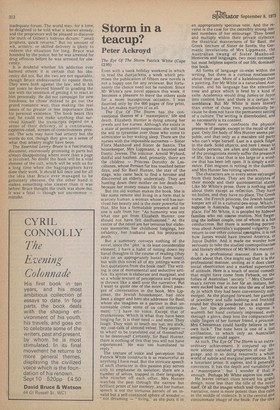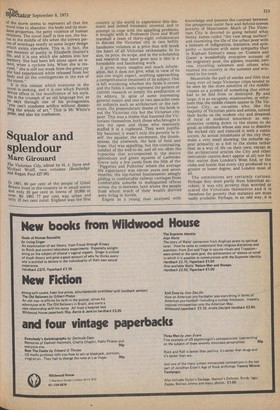Storm in a teacup?
Peter Ackroyd
The Eye Of The Storm Patrick White (Cape £2.95)
Even with a bank holiday weekend in which to read the dustjackets, a week which promises the publication of fifteen new novels is not a happy one for any reviewer. But fortunately the choice need not be random. Since Mr White's new novel appears this week, it becomes a pleasure to leave' the others aside for a more inauspicious occasion. I was daunted only by the 600 pages of fine print, but Art makes martyrs of us all.
The Eye Of The Storm has the conventional themes of a ' masterpiece,' life and death. Elizabeth Hunter is dying among her jewels and her nurses. Although she exists in a state of permanent suspension, she still has the will to tyrannise over those who come to administer to her waking sleep. There are the nurses with the impossible surnames — Sister Flora Manhood and Sister de Santis. The housekeeper, Mrs Lippmann, a haunted and frantic Jewess. The solicitor, Arnold Wyburd, dutiful and hairless. And, primarily, there are the children — Princess Dorothy de Lascabanes, whose Persian fur has touched better days, and Sir Basil Hunter, the star of the stage, who came back to find a heroine and discovered an elderly understudy. They are hunting down their mother on her death-bed because her money means life to them.
But the old woman makes the book. She is like some remote idol living in a form that is scarcely human, a woman whose will has survived her beauty and is the more powerful for that. She has a formidable presence and no one is safe from her: "As humanity was not what one got from Elizabeth Hunter, one should not h,ave felt disillusioned." At the centre of the novel are her tenuous but elaborate memories: her childhood longings, her infidelity, her husband and his protracted death.
But a summary conveys nothing of the novel, since the' plot' is its least considerable element. I have a habit of noting down my banal thoughts in the course of reading (they take on an appropriately banal form later), but with this novel all of my jottings were in fact quotations from the book itself. The writing is one of monumental and seductive artifice, Its syntax is elaborate and marginal, and so a whole texture of perceptions and images is thrown like a spell over the narrative. Rut I want to quote one of the more direct passtges of conversation in the book, Mrs Lippman, the Jewish housekeeper, had mice been a singer and here she addresses Sir Basil, whom she imagines as a partner in that unnameable crime some of us call entertainment: " I have no voice. Except that of drunkenness. Which is what they have been longing for. It is their need — and mine. They laugh. They wish to touch my hat, my stick, my coat-tails of almond velvet. They aspire — to what? to be translated out of themselves? to be destroyed? Certainly, Sir Basil Hunter, there is nothing of this that you will not have experienced.' He was too humiliated to reply."
The texture of voice and perception that Patrick White constructs is as resourceful as anything I have read. But the intricate speech of each character in this passion play serves only to emphasise its isolation; there are a number of selves, trapped in their language, who ricochet off each other. Mrs Hunter watches the past through the narrow but brilliant prism of her memory, and her human speech is not the tortuous parody of an invalid but a self-contained sphere of wonder — " not dreaming — "living," as she puts it in
an appropriately specious vein. And the reverse is the case for the ostnsibly strong-lirnbed members of her entourage. They breed and multiply within their private stylistics: the theatrical mannerisms of Sir Basil, the Greek tincture of Sister de Santis, the Germanic involutions of Mrs Lippmann, the Australian twang of Sister Manhood. Memories and languages, two most necessary but most helpless aspects of our life, dominate this book.
All forms of language co-exist within the writing, but there is a curious rootlessness about their use. More of a kaleidoscope than a painting, For Mr White is a naturalised Australian, and his language has the attentiveness and grace which is bred by a kind of exile. Academics would drag James or Joyce into context here, and there is a certain semblance. But Mr White is more literarY than either of those two, paradoxically because he does not have the permanent setting' of a culture. The writing is disembodied, and so necessarily is its content.
Mr White never confronts the physical presence of people, except in the recoil of disgust. Only the body of Mrs Hunter seems palpable, and that only as a macabre old party who can't wipe herself. Lust is a quick fidget in the dark. Solid objects, and here I mean to include persons, are alien and obtrusive. All of the protagonists merely suffer the presence of life, like a coat that is too large or a window that has been left open. It is simply a nuisance. Filet mignon is rotting in the dustbin, and Mrs Hunter lies rotting upstairs. The characters are in every sense estranged from their bodies. They are the acolytes d their moods and their quintessential states. Like Mr White's prose, there is nothing solid about them except as reflection. They have no bodies, and they have no place. The Greek nurse, the French princess, the Jewish housekeeper are all in a cultural pea-soup. Which, suppose is Australia. Vague and comfortless Place. Foi7 Mr White, it is peopled by hideous families who eat coarse mutton. Not forgetting the lesbian couple, one of whom is a bus conductress. But there is something portentous about Australia's supposed vulgarity. To return to our other colonial,eyamples, it is not how James would have treated America, or Joyce Dublin. And it made me wonder how seriously to take the studied cosmopolitanism and literary deference of Mr White's manner.
It is a professional manner, there is no doubt about that. One might say that it is the professional manner, uniting as it does close social observation and a marked superiority of attitude. Here is a touch of social comedy that might have come from Firbank, on the follies of Australian ' society ': "Mrs Cheese' man's nerves rose in her for an instant, but were sucked back at once into the sea of brafl'. dy in which they had been conveniently submerged. As she plunged forward, her garnish of jewellery and tulle bobbing and frothing round her thickly powdered neck and shoulder, her lips preceded her, to express a warmth her hand certainly impressed, even through a glove, deep into the comparatively chilly fingers of her former friend, a princess: Mrs Cheeseman could hardly believe in her own luck." The tone here is one of a lost civilisation, to which only an Australian emigre writer could aspire. As such, The Eye Of The Storm is an extraordinary achievement. It conjured up the now almost vanished properties of our language, and in so doing resurrects a whole world of subtle and marginal perceptions. It is a luxuriant prose. It aspires, and it generallY, convinces. It has the depth and variability ot a ' masterpiece '; but I wonder if that 15 enough. Perhaps Mr White aspires too much. He leaves certain clues toward his grand design, none less than the title of the novel' itself. Of all the images which trail through the narrative, none is more potent than this calm' in the middle of violence. It is the central and consummate image of the book. For the idea of the storm seems to represent all that the novel tries to abandon: the body and its mundane.properties, the petty violence of human relations. The novel itself is this eye, the hiatus in the middle of life when the strewn pieces.of wreckage testify to some larger design which exists elsewhere. This is, in fact, the one moment of purity in Elizabeth Hunter's life, and it is one which she admits into her rnemory. She had been left alone upon an island, when a cyclone hits. When she is rescued, " she is still too weak from the great joy she had experienced while released from her body and all the contingencies in the eye of the storm."
It is this release which everyone in the novel is seeking, and it is one which Patrick White offers in the munificence of his style. His is the triumph of an old language but, as e says through one of his protagonists, YOU can't condemn artifice without dismissing the whole of art." This is Mr White's Pride, and also his confession.



































 Previous page
Previous page